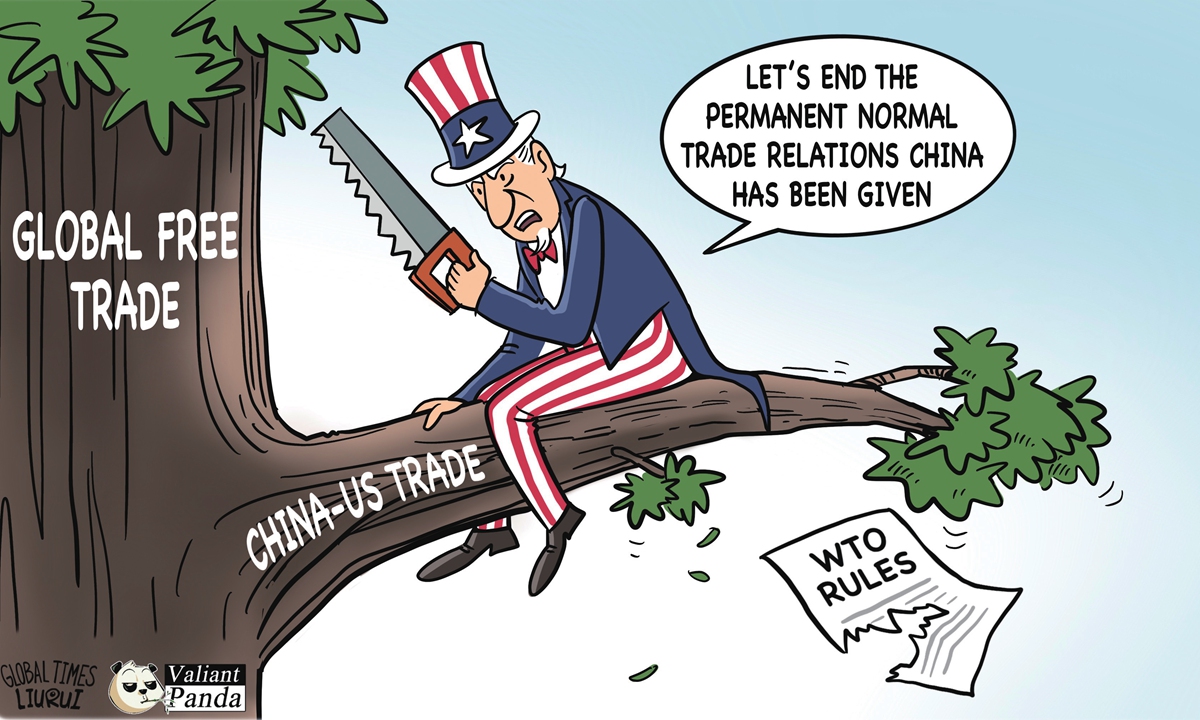
Illustration: Liu Rui/Global Times
The
MKS sports US-China Economic and Security Review Commission dropped a near 800-page report on Congress recently. Before we go any further, you need to consider the following words that appeared in the opening section: "The Commission conducted official fact-finding travel this year to Taiwan and Japan to hear and discuss regional perspectives on the United States' relations with China as well as trans-Pacific cooperation."
Read those words again. Notice anything peculiar? The commission provided a lengthy report about US-China relations and apparently did not visit China as part of its work. Instead it sought "regional perspectives," but none from the nation it scrutinized.
That reality alone ought to lead to significant questions about the reliability of such a document. Unfortunately, because of the current anti-China hysteria embedded into the collective psyche of political elites, no one will dare quibble.
The commission's report includes nine pages of recommendations, which are the key parts of the document. Within these pages, familiar complaints about China and the necessity for tough remedial action resonate strongly.
One recommendation, in particular, should frighten anyone who understands the critical role that free trade plays in the health of the American and Chinese economies. The commission is suggesting that Congress get rid of China's Permanent Normal Trade Relations (PNTR) status. It asserts such a move is necessary because China engages in "practices such as intellectual property theft and market manipulation." Eliminating PNTR would give the US "more leverage to address unfair trade behaviors."
Viewed in less fancy terminology, the commission wants the US to move toward protectionist trade policies. The US, the nation that touts the benefits of free trade and demands free trade practices be implemented by developing nations in order to secure favorable loans, is so determined to undermine China that it will abandon its own principles.
Keep in mind that 25 years ago, then president Bill Clinton pushed hard for China to enjoy favorable trade relations with the US. The US-China Relations Act of 2000 was necessary, according to Clinton, because "if we don't sell our products to China, someone else will step into the breach, and we'll spend the next 20 years wondering why in the wide world we handed over the benefits we negotiated to other people." In other words, China was opening up, and if the US was not first in line to reap the benefits of that, then it would find itself in perpetual catch-up mode.
What Clinton said became true: The US and Chinese economies became more intertwined. Both nations have benefited, as has the broader global community.
Critics are quick to point out that the US has had a trade deficit with China, and they use that reality to assert that major changes to trade policies are needed.
The Information Technology and Innovation Foundation (ITIF) throws cold water on such arguments. Its careful analysis shows that the US faces trade deficits with South Korea, Japan and Germany, to name just three countries, primarily because America does not export enough products. There is another caveat to remember: "American firms such as Apple, Intel, Microsoft, Tesla, McDonalds, Marriott, Starbucks, Walmart, and many others do a great deal of business within China, which isn't counted as U.S. exports." The ITIF notes that "a core part of America's trade deficit is that the United States lags in the competitive manufacturing of must-have, high-value goods... If America is to reduce tensions and increase mutual dependencies, then allowing, incenting, and/or requiring Chinese manufacturing in the United States - for batteries, solar panels, and electric vehicles, for example - is a strategy that could help. "
Such common sense realities are not welcomed in Washington, where bashing China is the only message that is heard.
Remember that prior to the 2000 Act, Congress was authorized to review China's trade practices on an annual basis. Should the aforementioned recommendation be supported, that yearly review would again kick in; the potential for raw politics to further damage US-China trade is obvious.
The author is an associate professor at the Department of Communication and Organizational Leadership at Robert Morris University. opinion@globaltimes.com.cn

